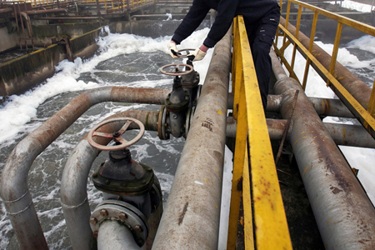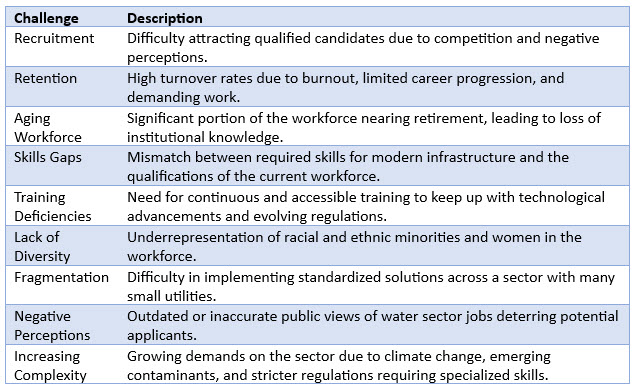The Future Is Flowing: Cultivating The Next Generation Of Water Professionals
By Ashwin Dhanasekar and Zonetta English

The water sector is fundamental to public health, environmental stewardship, and economic stability. A skilled workforce is crucial for these essential services. However, the sector faces a looming workforce crisis due to an aging demographic and increasing retirements, with about one-third of the workforce eligible to retire in the next decade. Attracting and retaining new talent is also challenging due to competition from other industries offering potentially more attractive compensation and career paths. Furthermore, technological advancements demand a workforce with specialized technical skills. This article explores these challenges and opportunities, examining how major water utilities are proactively addressing these issues and analyzing strategies for cultivating the next generation of water professionals.
The water sector workforce faces challenges in attracting and retaining qualified individuals due to competition from other sectors with potentially better salaries and career progression. The demanding nature of the work can also lead to burnout and turnover, especially with insufficient support and work-life balance. A significant portion of the current workforce is nearing retirement, with approximately one-third of drinking water and wastewater operators in the U.S. eligible within the next 10 years. This impending wave of retirements risks losing critical institutional knowledge and expertise. Mentoring programs and robust succession plans are essential to mitigate this loss.
A widening skills gap also poses a challenge, as many job seekers lack the specific qualifications for modern water infrastructure. Rapid technological advancements in areas like smart infrastructure and data analytics exacerbate this gap. Targeted on-the-job training and accessible certification resources are necessary to address this. Continuous training is vital to keep the workforce updated with the latest industry practices. Furthermore, the water sector lacks racial and gender diversity, which can limit its ability to serve diverse communities and hinder innovation. Cultivating a more diverse and inclusive workforce is crucial for better retention and innovation.
Despite these challenges, the water sector offers stable, high-quality careers with a direct positive impact on public health and the environment. The current situation necessitates innovation in workforce development. The fragmented structure of the sector, with many small utilities, complicates the implementation of uniform solutions. Negative public perceptions of water sector careers can also deter potential candidates. Increasing complexity in water management due to climate change and emerging contaminants further emphasizes the need for a skilled and adaptable workforce.

Major water utilities significantly contribute to local economies through job creation across various roles. Infrastructure projects by these utilities inject capital into local economies, involving local companies and creating jobs for skilled tradespeople. Water utilities often support local businesses through procurement. Reliable water services are fundamental for all other businesses, and disruptions can cause substantial economic losses. Public understanding of water services is crucial for responsible water usage and support for infrastructure investments. Public perception directly influences water conservation. Below are some case studies of key utilities and the actions they have taken.
New York City Department of Environmental Protection (NYCDEP): NYCDEP significantly impacts its regional economy through direct employment, substantial infrastructure investments, and support for local businesses via procurement programs and watershed community funding. They actively engage the public to foster water conservation and support for infrastructure through initiatives like the Adopt-a-Bluebelt program, the Water Resources Annual Art and Poetry Contest, and educational resources provided via the Newtown Creek Wastewater Treatment Plant Visitor Center. While specific statistics for these outreach programs aren't readily available, the city utilizes integrated data systems to track performance metrics across various workforce development programs managed by city agencies, aiming to build a comprehensive picture of participant outcomes and career pathways.
Louisville Metropolitan Sewer District (MSD): Louisville MSD serves as a major economic engine, supporting an estimated 3,000 construction jobs annually through its capital programs. Their $4.3 billion, 20-year Critical Repair and Reinvestment Plan is projected to generate a local economic impact of $5 billion and sustain 3,700 jobs per year over two decades, with every dollar invested yielding $2.62 for the local economy. A key component is the MSD JobLink program, an online portal connecting local contractors with job seekers from Louisville and surrounding counties (including specific counties in Kentucky and Indiana) for work on MSD projects, particularly supporting their Local Labor Preference policy for contracts over $5 million. MSD also prioritizes public education through its Municipal Separate Storm Sewer System (MS4) program and collaborations on workforce awareness.
District of Columbia Water and Sewer Authority (DC Water): Recognizing its significant capital program, DC Water launched the DC Water Works initiative to boost local hiring on its projects. This program set ambitious goals for contractors to have at least 60% local residents in their total workforce and fill 75% of new jobs with local residents. In its first year, DC Water contractors filled 125 new positions, with 112 hires coming from the jurisdictions served (including 76 District residents). DC Water Works also focuses on training and mentorship, including partnerships for green infrastructure certification and running a successful CDL training program that saw 10 District residents employed. Public outreach includes facility tours, book readings, classroom sessions, and hands-on activities to promote understanding of water issues.
Washington Suburban Sanitary Commission (WSSC) Water: Serving 1.9 million residents in Maryland's Prince George's and Montgomery Counties, WSSC Water actively engages the community and local businesses. Their educational outreach is substantial, reaching over 2,000 students and 100 educators annually through various programs. Faced with high demand for student plant tours across the large school districts in its service area, WSSC Water creatively developed award-winning virtual tours using platforms like Google Earth, ensuring content accuracy with plant staff expertise and effectively bringing the water/wastewater treatment experience to classrooms.
Attracting young professionals requires hands-on experience through internships and apprenticeships. Mentorship programs are also crucial for knowledge transfer and career guidance. Highlighting the positive impact of the water sector on public health and the environment can attract purpose-driven young people. Showcasing technological advancements is also important. Clearly defined career pathways and growth opportunities are essential for attracting and retaining young talent. Investing in early engagement with schools and universities is another effective strategy. Offering competitive compensation and benefits remains fundamental. Creating inclusive workplaces that support diversity is also key. Utilities can raise awareness through community engagement and publicizing job descriptions and training programs.
The water sector is undergoing technological transformation with increasing automation, data analytics, artificial intelligence (AI), and smart infrastructure. These advancements require a workforce skilled in data analysis, cybersecurity, and AI/machine learning (ML). While automation may reduce manual labor, it increases the demand for specialized technical expertise. These technologies offer benefits like improved efficiency, resource management, and enhanced water quality monitoring. However, the increasing reliance on technology exacerbates the skills gap. Targeted training and upskilling are crucial for the current and future workforce. Collaboration between utilities, technology providers, and educational institutions is essential to bridge this gap.
Numerous successful initiatives address workforce challenges. Utilities are also exploring AI for operational efficiency. These initiatives often show increased retention rates and improved diversity. Collaboration and partnerships are key to their success.
Understanding workforce demographics is crucial. The median age in the water sector is around 48, older than the national average. Approximately one-third of operators will be eligible to retire in the next decade, while only about 10% of the workforce is under 24. The sector is predominantly male, with women underrepresented in technical roles. Racial and ethnic diversity also needs improvement. There is a growing need for skills in data analytics and cybersecurity. Recent projections indicate a potential decline in some key roles, but retirements will create openings. Targeted efforts are needed to attract younger professionals and underrepresented groups.

The future of the water sector relies on a proactive and collaborative approach to workforce development. Addressing recruitment, retention, skills gaps, aging workforce, and lack of diversity requires comprehensive strategies. Water utilities are vital economic drivers, and their public outreach is crucial. Attracting young professionals requires showcasing the sector's purpose and technological advancements through internships and mentorships. Emerging technologies demand a skilled workforce through continuous learning. Learning from successful programs emphasizes collaboration and long-term investment in human capital. Demographic data typically highlights the need for greater diversity.
The water sector is experiencing significant change due to an aging workforce and technological advancements. Based on a quick recent industry analysis, below are key skills and jobs expected to be in demand:
In-Demand Skills:
- Technical & Operational: Expertise in managing advanced treatment technologies, operating and maintaining aging and new infrastructure, SCADA (Supervisory Control and Data Acquisition) systems, and field operations.
- Digital & Data: Proficiency in data analytics, cybersecurity, GIS (Geographic Information Systems), AI/Machine Learning, hydraulic/flood modeling, and digital transformation integration across operations.
- Environmental & Sustainability: Knowledge of nature-based solutions, net-zero strategies, bioresources management, water quality analysis, regulatory compliance, and climate change adaptation.
- Engineering: Civil, environmental, mechanical, and electrical engineering skills applied to water/wastewater systems, asset management, and project management.
- Soft Skills: Communication, problem-solving, collaboration, adaptability, and leadership, particularly for knowledge transfer and managing diverse teams.
In-Demand Jobs:
- Operators: Water Treatment Plant Operators, Wastewater Treatment (Water Resource Recovery) Operators, Collection System Operators, Distribution System Operators.
- Engineers: Water Resources Engineers, Environmental Engineers, Civil Engineers, Project Engineers/Managers.
- Technicians & Specialists: Instrumentation and Control Technicians, SCADA specialists, GIS Analysts, Data Scientists/Analysts, Cybersecurity Specialists, Environmental Compliance Specialists, Lab Analysts, Utility Locators.
- Management & Support: Asset Managers, Utility Managers, Planners, Customer Service Representatives, Human Resources Specialists (focused on workforce development/recruitment), Communications Specialists.
- Skilled Trades: Electricians, Mechanics, Heavy Equipment Operators, Plumbers, Pipefitters (often needed for construction and maintenance projects).
The utility sector anticipates growth, and retirements will create numerous openings across these roles. Attracting younger, diverse talent will be crucial, requiring utilities to highlight career stability, competitive benefits, opportunities for technological engagement, and the sector's vital contribution to public health and the environment.
To cultivate the next generation of water professionals:
- Develop targeted recruitment campaigns highlighting the value of water careers, targeting younger generations and underrepresented groups.
- Invest in robust training and apprenticeship programs expanding access to high-quality training incorporating the latest technologies.
- Create mentorship and knowledge transfer programs facilitating the transfer of knowledge from experienced professionals.
- Promote diversity and inclusion initiatives implementing strategies to attract and retain individuals from diverse backgrounds.
- Embrace technological advancements and provide opportunities for workforce upskilling by investing in training for advanced systems.
- Strengthen partnerships between utilities, educational institutions, and community organizations to develop workforce pipelines.
- Enhance public outreach and education to educate the public about the value of water and water professionals.
By embracing these recommendations, the water industry can potentially cultivate a sustainable workforce for the future.
Ashwin Dhanasekar is a Principal at Brown & Caldwell, serving in Research & Innovation and Digital Solutions. Ashwin’s expertise encompasses biosolids management, microplastics, intelligent water systems, and the energy-water nexus. Ashwin also co-found a company, Ajax Analytics, which provides data-driven environmental monitoring solutions. Ashwin has a chemical and environmental engineering background.
Zonetta E. English is the Strategic Initiatives & Project Delivery Director for the Louisville Metropolitan Sewer District. Zonetta has over 30 years of experience in the wastewater industry: research, project management, business process modeling, evaluating technology, and managing/developing strategic partnerships. She provides technical expertise for senior leadership within her utility. Zonetta has a chemistry degree, MBA, and holds a certification with the Design Build Institute of America (DBIA).
